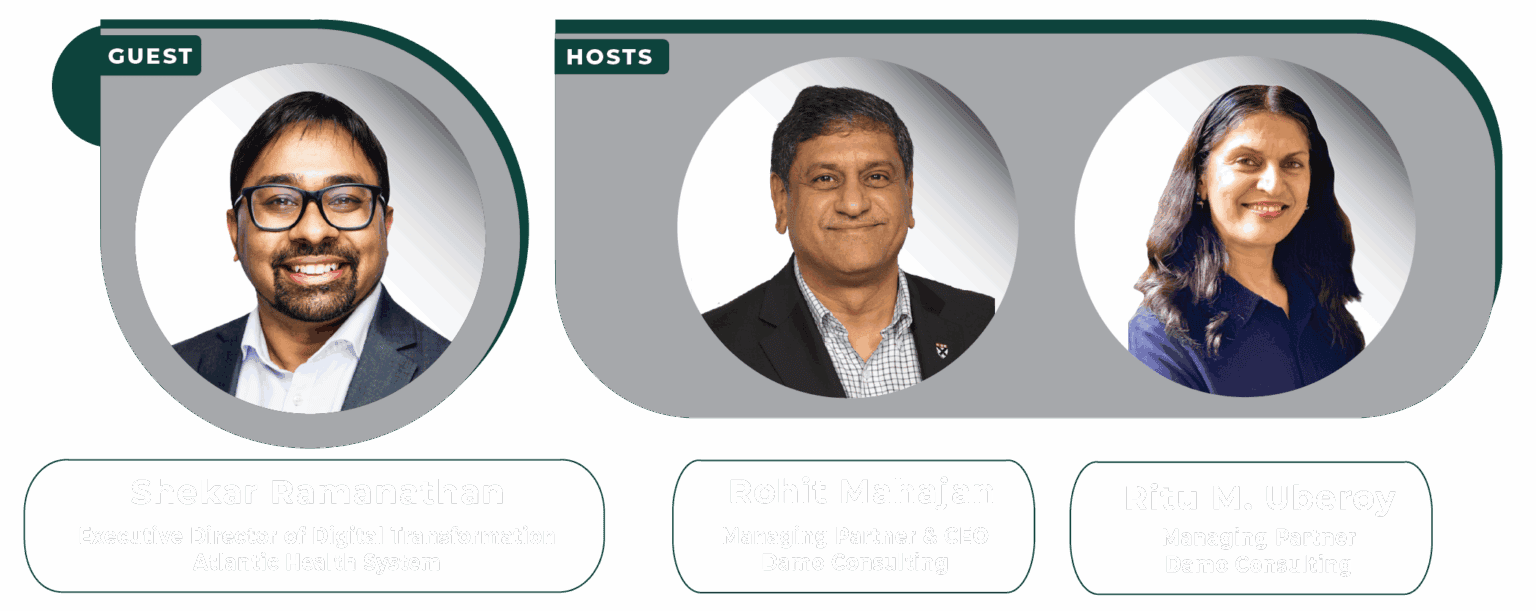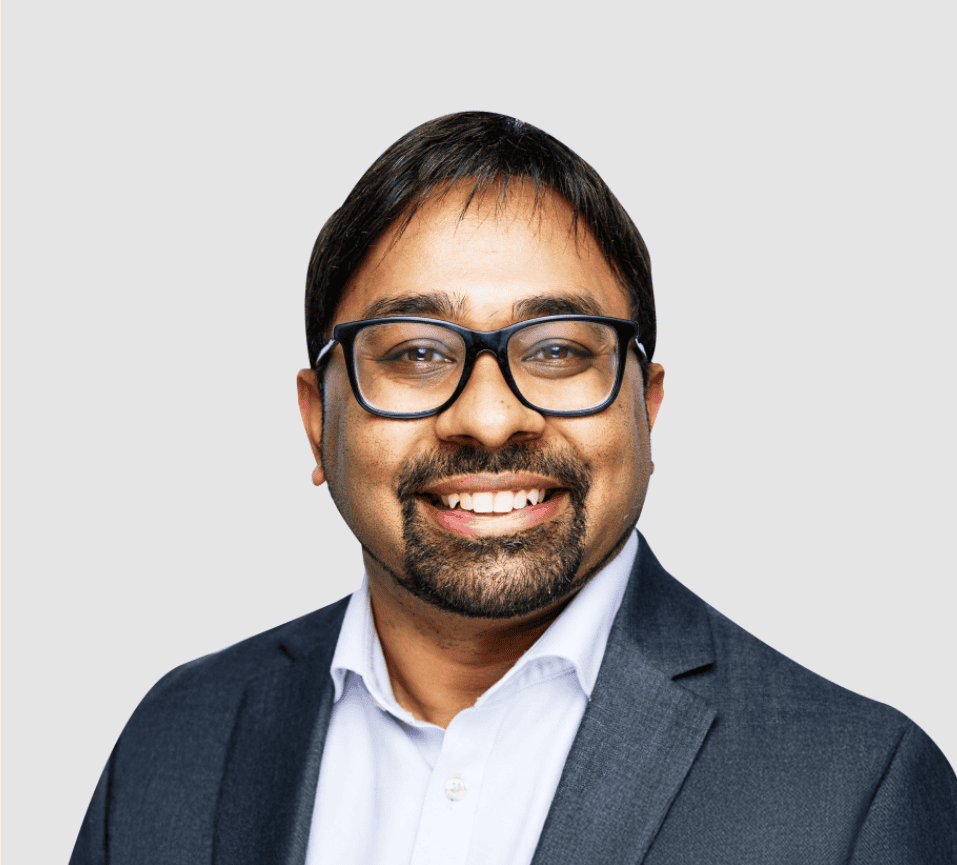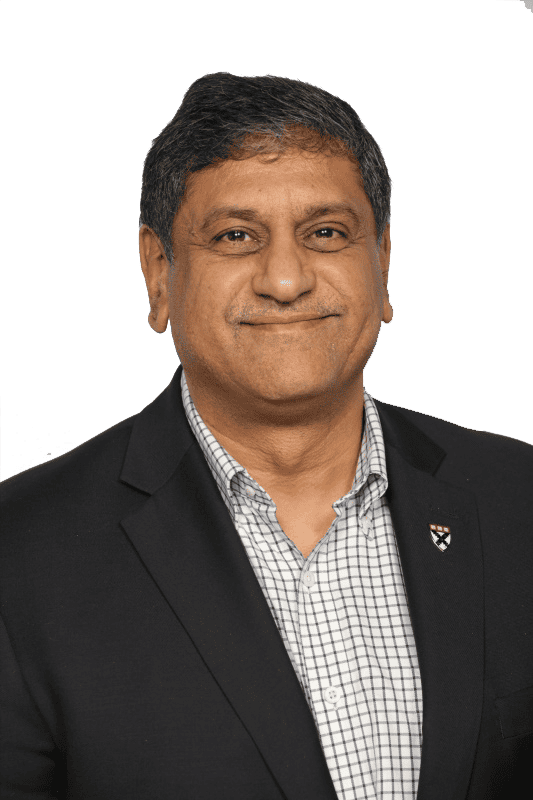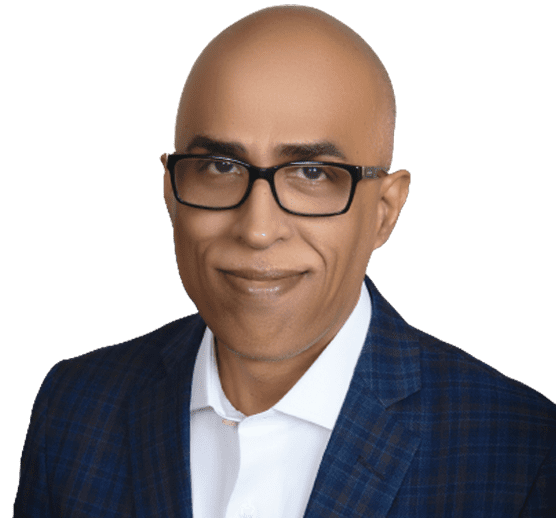Season 6: Episode #163
Podcast with Shekar Ramanathan, Executive Director of Digital Transformation, Atlantic Health System

Share
In this episode, Shekar Ramanathan, Executive Director of Digital Transformation at Atlantic Health System shares how the organization is evolving from traditional automation to a future shaped by agentic AI. He shares Atlantic Health’s journey from pilot projects to scalable AI implementations, highlighting real-world use cases such as ambient scribing, intelligent message routing, and virtual medical assistants for patient engagement.
Shekar outlines how Atlantic leverages generative AI to tackle both clinical and operational challenges, guided by a strategy that aligns AI initiatives with organizational goals. He emphasizes working backwards from the outcomes, integrating AI into specific workflows, and the need for strong governance frameworks. He also shares insights on Atlantic’s AI maturity model, challenges in scaling, cost containment, prompt engineering, and the critical role of education and cultural change.
Looking ahead, Shekar sees agentic AI as a transformative force—one that reduces administrative burden and unlocks new levels of autonomy in care delivery. He also reflects on the rising importance of Chief AI Officers in driving responsible and effective AI strategy across health systems. Take a listen.
Show Notes |
||||
| 01:14 | What interests you in the healthcare industry segment to become the CIO of a hospital system? | |||
| 02:47 | How long have you been in the leadership position at UMC, where is it located, and what kind of population does it serve? | |||
| 03:35 | You have done a lot of work from technology perspective to support the business needs of the hospital. You've done over 200 applications and transformed the EMR system. Would you like to share with the audience the thought process that drove those changes and what were some of those changes? | |||
| 07:47 | What do you think about your digital transformation efforts? If you could describe a few of them which have had impact on the patient population. | |||
| 08:30 | Please describe in your own, you know, way that what is digital transformation for provider systems such as yours? Where do you see it going? Some of the challenges that you might have faced and how did it actually end up impacting patients? | |||
| 11:24 | How did you manage to change the mindset of the people? How did they manage to change themselves? To adapt to this new world where technology, especially with AI and GenAI and other new technologies which are coming our way, how do you change mindsets and change behaviors and change culture over there? | |||
| 13:00 | Would you like to provide one example of how the technologies which you were implementing, and you continue to be implementing in your hospital system are accessible and usable by a variety of users, including within the hospital and outside the hospital. | |||
| 16:28 | How do you innovate? Do you involve external parties? Do you have some kind of a, you know, innovation focus department? Or is it part and parcel of everybody's, you know, kind of like daily life? | |||
| 19:24 | What are your thoughts on new technologies, especially Gen AI? Have you been experimenting with any predictive analytics or large language models? What would be your advice or thoughts to any other healthcare leaders on how to go about this journey of exploration? | |||
| 22:15 | Standing here now and looking back, if you were able to go back and change one or two things, what would you like to do differently or have done differently? | |||
Video Podcast and Extracts
About Our Guest

Shekar Ramanathan has over 20 years of progressive leadership experience in health information technology and is a nationally recognized speaker on enhancing patient and provider experiences through digital transformation. He has been honored on various well recognized lists, including Becker’s Healthcare Up and Comers in Health IT, and was recently recognized as an NJBIZ Leaders in Digital Technology honoree for his contributions to the field.
Currently serving as the Executive Director of Digital Transformation for Atlantic Health System, he is responsible for developing the digital strategic vision and designing holistic solutions that enhance patient, clinical, and operational experiences. His data-centric approach to real-time decision-making and adoption of cutting-edge technologies has positioned the organization as a healthcare pioneer. Additionally, he has spearheaded the creation of new business opportunities by leveraging emergent technologies such as AI, machine learning, and predictive analytics.
He holds a Bachelor's degree in Information Systems from the University of Washington, graduate education in Medical Informatics and Healthcare Management from Oregon Health & Science University, and an MBA from The Ohio State University. He also holds numerous certifications, including Certified Healthcare CIO (CHCIO), Certified Digital Health – Executive (CDH-E), and Certified Professional in Healthcare Information & Management Systems (CPHIMS).
Recent Episodes
Ritu: Hi Shekar, welcome to The Big Unlock podcast. It’s really nice to have you on the show. We’re now in our sixth season, with over 150 episodes and a great listener base. We’re excited to have you here and look forward to a lively discussion.
I’m Ritu M. Uberoy, Managing Partner at BigRio and Damo Consulting, and also a co-host of The Big Unlock podcast. I’d like Rohit to say a few words before we hand it over to you.
Rohit: Short intro from my side as well, Shekar. I’m Rohit Mahajan, CEO and Managing Partner at BigRio and Damo Consulting, based in Boston. As I mentioned, we’re very happy to have you on the podcast.
Shekar: It’s a pleasure to be here, and I’m looking forward to a great conversation with both of you.
I’m Shekar Ramanathan, Executive Director of Digital Transformation at Atlantic Health System. We’re a seven-hospital—soon to be eight—health system based in New Jersey, with over 20,000 employees and about half a million patients in our ACO.
We’re a fairly large organization, and I’m responsible for the integration of digital, AI, and data—essentially, using technology to solve business and clinical problems.
We’re really focused on working outcomes backward: identifying what we want to accomplish, the metrics we aim to achieve, and then developing solutions to meet those needs.
Ritu: Great. Great. We all know generative AI is the buzzword right now. I just attended two conferences—HIMSS and Human X—both heavily focused on AI, generative AI, and now the latest: agentic AI.
We’d love to hear your thoughts on these technologies, your AI maturity model at Atlantic Health, and where you feel the organization stands in terms of AI maturity. Also, tell us about some initiatives you’ve led or are currently working on.
Shekar: Sure. I don’t think I’ve been at a conference or had a talk in the past two years that hasn’t been about AI. Even if it starts with something else, it ends with AI. It’s definitely the hot topic no matter where you go.
For us, it’s very much focused on the “what are we still like…” I think our strategy hasn’t changed in terms of what we’re trying to do from a digital or organizational perspective. What we’re really trying to do is see how we align that with the new capabilities that are emerging—continuing the same business strategy, which is always somewhat challenging because people keep asking, “What is our AI strategy?”
I used to say our AI strategy is our business strategy—it’s not any different. But I’ve somewhat changed that over the past two years. Now, our AI strategy is really about building the framework. It’s about enabling the business and understanding where the technology is going so we can be in a position to fully leverage it.
That means setting up the right governance and the right processes to monitor AI—to ensure it’s the right solution and at the right cost. I think that’s been a challenge for many organizations. You see a lot of piloting—we started there too, with plenty of pilots. But scalability becomes a challenge.
Then comes the question: who are the right people to use these tools? How do we extract value and not just get excited by the art of the possible?
We’ve done a lot of what other health systems are doing—ambient voice, note summarization, routing of messages, and so on. But we’ve also done some novel things, like focusing on a virtual MA where we use a quasi-agentic approach. Not fully agentic, but using some of those tools for outreach, patient communication, helping manage care—with escalation to a clinician or care provider whenever necessary.
We’ve seen a lot of success. At the same time, we know things are changing rapidly. That’s probably one of the biggest challenges—not just for us, but for healthcare in general. We’re used to a fairly slow process—just selecting a vendor, signing a contract, going through implementation—it’s usually a long timeline.
Now, by the time you select a vendor, the next one is already out, doing it better. So how do we shift to being truly agile in our thinking? Solving problems in smaller pieces, being more iterative—those have been some of our key focus areas and challenges.
Ritu: Great answer, Shekar. It’s amazing that you mentioned the top three use cases—ambient, scribing, and message in boxing. You mentioned that going from pilot to scalability is a challenge. Could you pick one of these initiatives and talk a bit more about your experience—specifically, the timeline and what that looked like?
To give some context, I attended a talk at HIMSS about innovation using GenAI, and one of the takeaways was that culture can be both an enabler and a barrier. You have to be open-minded and ready for these accelerated timelines, but if there isn’t buy-in across the organization, change becomes difficult. Would love to hear your thoughts on that.
Shekar: Absolutely. I think one of the key things is that people often start by piloting with a highly engaged, super excited group—folks who really want to leverage the technology. They get great results in that small setting. But when it’s time to scale, it becomes difficult to replicate the same level of adoption, utilization, and value.
We’ve had more success when we focus on narrow workflows—being very intentional about what problem we’re trying to solve. That allows us to have the bandwidth to do proper education, integrate the technology into the workflow, and not just introduce a tool that people are playing with.
With a lot of the GenAI tools, what we’ve seen is a burst of initial excitement—people want to try it, see what it can do, maybe generate a song about COPD, and that’s great. But then reality kicks in. When people are back to caring for patients, they ask: Is this actually saving me time? Do I know how to write a good prompt? Do I understand when it’s useful—or not?
We’ve had more benefit by being very prescriptive: “Here’s the use case, here’s the prompt, here’s the button to click.” That helps users adopt the tool more effectively and ensures they see real value.
It also helps with cost control. These tools can get expensive as they scale, much like how cloud costs were a challenge to predict a few years ago—but AI takes that challenge to another level. So we want to manage rollout carefully, ensure users understand the benefits, and then scale in a controlled, thoughtful way.
Ritu: Okay. Thank you. Next, we would like to talk about the role of a Chief AI officer and if Atlantic Health has a Chief AI officer, and what do you think would be the pros and cons of, you know, that role and what are your viewpoints about that role?
Shekar: So, we don’t have a Chief AI Officer per se. We have a lot of people who kind of wear the Chief AI Officer hat—myself included—where part of my role is to drive what our AI strategy is. And that means different things to different people, right?
For us, it’s really about how we lay the infrastructure so we can support the different ideas and initiatives that are coming in. It’s also about identifying what’s truly different between an AI project versus a digital project or a regular technology project—what do we need to think about differently?
Then, depending on whether it’s a business use case or a clinical use case, we need to make sure we’re bringing in the right stakeholders. Especially on the clinical end, we need to have the right clinicians involved and really understand the potential impact—and make sure we have the right processes around that.
So it ends up being a group effort. I definitely see the role evolving, but the question is whether it becomes a purely dedicated position or if it stays tied into roles like data leadership or digital transformation. I think it really depends on the organization—what makes sense for them, and the size and scale of their AI ambitions.
That said, I do think we’re going to see a lot more Chief AI Officers emerge, especially as the space grows, the opportunities expand, and there’s a greater need for structure and oversight.
Ritu: Yeah. What we’ve seen with other folks we’ve been talking to is that the real need for a Chief AI Officer, like you said, is around strategy. Multiple people can wear those hats and do the work, but the real need they felt was around governance, ethics, bias, and some of the other thorny problems that crop up.
Would you like to talk about any challenges you’ve faced—primarily in terms of AI implementation—like hallucination, bias, or data integrity? And how you’ve overcome those challenges?
Shekar: Yeah, and I think one of the biggest challenges is really understanding what a lot of these vendors are doing, especially given the pace at which innovation is happening. And then there’s the challenge around black box AI, right? I mean, that’s the so-called “vendor secret sauce.”
But at the same time—are they really doing something truly innovative? Are they actually getting results? How is it working? Do we know what data they trained it on? Patients in a rural area may be very different from those in an urban area. Or maybe the model was only trained on adults and not pediatric patients. There are so many variables that can introduce bias.
There are also a lot of things that can make a model either work for you or not. So how do you really evaluate that? Right now, a lot of these companies are coming to us without the level of research and documentation we’re used to—things like clear evidence of efficacy or quality outcomes.
It’s sometimes hard to get that information, because this is a new, shiny object and people are excited about the art of the possible. That’s especially challenging for us on the operational side. People come in with a great idea, and they’re promised big results that maybe they don’t fully understand.
It’s like—someone says this tool is 99% accurate. But then, when you look at the positive predictive rate, you realize that nine out of ten times, it throws a false positive. So now you’re getting ten alerts for every one useful one.
Is that really helpful? Sure, it’s 99% accurate—but it shows up all the time, and that affects how people experience it. So we have to interpret that correctly and make sure the business is fully aware of what the actual experience will be—before we sign a contract, implement the tool, and then find out later that it doesn’t meet expectations.
Rohit: Shekar, I’m very interested about your journey in healthcare so far. The audience always likes to know what got you started, what interests you. What are you thinking about the future as well? So if you can share with us what motivated you to take on this role and how you walked into the healthcare industry segment, and where are you headed?
Shekar: It would be great. Yeah, no, absolutely. I’ve always been in the healthcare technology space. I went to grad school for medical informatics—back when nobody really knew what that meant. And now it feels like everything is kind of coming together.
I started more on the development and consulting side, working with a number of state governments to develop syndromic surveillance systems and similar initiatives. I also did a lot of research around patient experience during grad school.
Eventually, I ended up at Epic and spent some time there. That gave me a lot of exposure to electronic health records and large health systems. After that, I worked across several large healthcare systems—BayCare Clinic, Kettering Health Network, Wake Forest Baptist Health—and eventually landed here at Atlantic Health System.
Over time, I’ve been focused on clinical applications, digital transformation, generating value from data, and process optimization. And now I’m at a point where I can pull all those different pieces together and apply them more broadly.
I’m really excited about the potential of AI right now. I’ve been talking about the future of healthcare technology for a long time—what we could do with EHRs, how to collect and use data—and now it feels like we’re finally at a tipping point. We’ve spent years burdening our clinicians with documentation, all with the hope that it would one day lead to better care, and I think AI is finally enabling that transformation.
That’s why there’s so much excitement in the space. People are energized—maybe even tripping over themselves a bit—trying to figure out the right solutions. I share in that excitement, but I also want to make sure we do it right. We’ve moved at a glacial pace for a while, and now we’re ready to sprint—but we need to do it ethically and consciously, always focused on outcomes.
I feel really fortunate to be at this point—where everything in my background is converging, and I get to be part of pushing healthcare forward.
Rohit: Absolutely. I’ll add one more thing here, Shekar—I think you’re right we are at an inflection point. I completely agree with you there. A lot of changes are coming at us fast, and we have to adapt and adopt the technologies that are actually useful.
From a patient perspective—since you mentioned Atlantic Health System is based in New Jersey and you serve around half a million patients—can you tell us more about that geography? Is your patient population very diverse? And is there anything you’d like to share about patient engagement?
Shekar: Yeah, absolutely. So, we’re primarily based in New Jersey, with a bit of presence in New York and Pennsylvania, but mainly focused in northern and central New Jersey. We have 500,000 patients in the ACO, and even more overall.
New Jersey is very diverse, and that diversity really comes into play when we start talking about things like health equity and digital engagement. One of the challenges is figuring out how to reach patients with varying levels of digital literacy.
Interestingly, the patients who could benefit the most from digital tools often face the most barriers to accessing care in general. So, the question becomes: how do we make it easy and accessible for everyone? There’s a portion of the population that will be really excited that there’s an app for everything, but the ones who really need it may not be thinking in those terms. So, it’s about how we reach out, educate them, and truly enable them to be partners in their own care.
Ritu: Yeah, I think we’re almost at time. Shekar, would you like to share any closing thoughts? It’s been a really engaging discussion. Maybe you could tell us what you see as the top three future trends with generative AI?
Shekar: I think the next big thing’s gonna be agentic AI. It’s the next evolution as things become more and more “autonomous.” I think we’re gonna see a lot of kind of a hybrid, kind of a mix of agent traditional generative AI solutions.
I think a lot of this comes down to how do we start removing a lot of kind of that burden of healthcare. We’ve spent a lot of time asking providers to do more and more, and there’s where people are excited is that, maybe more of that can get offloaded so clinicians can really focus on direct patient care and a lot of those other things that may be more administrative or tangential.
That’s really where I think we’re gonna see a lot of technology that’s going to be able to kind of help solve some of those problems.
Subscribe to our podcast series at www.thebigunlock.com and write us at [email protected]
Disclaimer: This Q&A has been derived from the podcast transcript and has been edited for readability and clarity.
About the host
Paddy is the co-author of Healthcare Digital Transformation – How Consumerism, Technology and Pandemic are Accelerating the Future (Taylor & Francis, Aug 2020), along with Edward W. Marx. Paddy is also the author of the best-selling book The Big Unlock – Harnessing Data and Growing Digital Health Businesses in a Value-based Care Era (Archway Publishing, 2017). He is the host of the highly subscribed The Big Unlock podcast on digital transformation in healthcare featuring C-level executives from the healthcare and technology sectors. He is widely published and has a by-lined column in CIO Magazine and other respected industry publications.

Rohit Mahajan is an entrepreneur and a leader in the information technology and software industry. His focus lies in the field of artificial intelligence and digital transformation. He has also written a book on Quantum Care, A Deep Dive into AI for Health Delivery and Research that has been published and has been trending #1 in several categories on Amazon.
Rohit is skilled in business and IT strategy, M&A, Sales & Marketing and Global Delivery. He holds a bachelor’s degree in Electronics and Communications Engineering, is a Wharton School Fellow and a graduate from the Harvard Business School.
Rohit is the CEO of Damo, Managing Partner and CEO of BigRio, the President at Citadel Discovery, Advisor at CarTwin, Managing Partner at C2R Tech, and Founder at BetterLungs. He has previously also worked with IBM and Wipro. He completed his executive education programs in AI in Business and Healthcare from MIT Sloan, MIT CSAIL and Harvard School of Public Health. He has completed the Global Healthcare Leaders Program from Harvard Medical School.

Ritu M. Uberoy has over twenty-five years of experience in the software and information technology industry in the United States and in India. She established Saviance Technologies in India and has been involved in the delivery of several successful software projects and products to clients in various industry segments.
Ritu completed AI for Health Care: Concepts and Applications from the Harvard T.H. Chan School of Public Health and Applied Generative AI for Digital Transformation from MIT Professional Education. She has successfully taught Gen AI concepts in a classroom setting in Houston and in workshop settings to C-Suite leaders in Boston and Cleveland. She attended HIMSS in March 2024 at Orlando and the Imagination in Action AI Summit at MIT in April 2024. She is also responsible for the GenAI Center of Excellence at BigRio and DigiMTM Digital Maturity Model and Assessment at Damo.
Ritu earned her Bachelor’s degree in Computer Science from Delhi Institute of Technology (now NSIT) and a Master’s degree in Computer Science from Santa Clara University in California. She has participated in the Fellow’s program at The Wharton School, University of Pennsylvania.

Paddy was the co-author of Healthcare Digital Transformation – How Consumerism, Technology and Pandemic are Accelerating the Future (Taylor & Francis, Aug 2020), along with Edward W. Marx. Paddy was also the author of the best-selling book The Big Unlock – Harnessing Data and Growing Digital Health Businesses in a Value-based Care Era (Archway Publishing, 2017). He was the host of the highly subscribed The Big Unlock podcast on digital transformation in healthcare featuring C-level executives from the healthcare and technology sectors. He was widely published and had a by-lined column in CIO Magazine and other respected industry publications.
Stay informed on the latest in digital health innovation and digital transformation